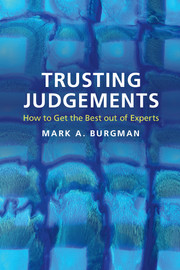1 - What's wrong with consulting experts?
Published online by Cambridge University Press: 05 November 2015
Summary
I came into the kitchen this morning and the sink was blocked. My wife, who is handier than me, tried the usual things: some drain-cleaning fluid and then a plunger. Despite her enthusiasm for the task, the drain remained blocked. So I rang a plumber. An expert. Someone who has done it before, has the right equipment, and has solved much more difficult drainage problems than were created by my inattention to coffee grounds.
I'm all for the division of labour and specialisation. It's an especially wise strategy for me because I'm one of the world's least handy people. If I need to clear a drain, I call a well-regarded plumber. If I wanted to build a sturdy bridge, I'd contact an engineer who has built lots of bridges. When I needed my knee reconstructed following a bad football tackle, I asked around and found an experienced surgeon with a good reputation.
I'll refer to those expert abilities as skills. Skills are abilities to execute particular tasks efficiently and effectively, acquired through training, concrete practice and feedback. In all these cases, when their actions don't succeed, it's hard for the expert to blame someone else. Their failures are unambiguous and personal. Ideally, you'll be able to look at their records of efficient drain clearing, bridge building and surgical outcomes. Of course, there are shoddy plumbers, reckless engineers and incompetent surgeons. But in the main, they will do a much better job of these things than me.
This book is not about such skills. We also rely on experts for advice when we need to make decisions and we don't have enough information. In government, business and elsewhere, our reliance is greatest when circumstances are unique, the consequences of the decision are significant, the decision is imminent and the future is uncertain. This book deals with the experts on whom we rely for estimation and prediction. Typically, such experts are defined by their qualifications, their experience – and importantly, by their status among their peers. We find someone with the right training and experience, someone whom we trust and can understand. Often, expert judgement is all we have. However, our propensity to turn to experts and accept their judgements uncritically, even when we don't need to, often appears to be automatic, or at least not sufficiently cautious.
Information
- Type
- Chapter
- Information
- Trusting JudgementsHow to Get the Best out of Experts, pp. 1 - 26Publisher: Cambridge University PressPrint publication year: 2015
